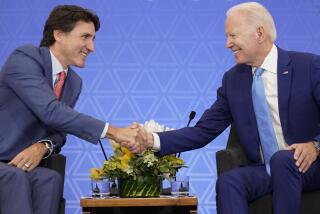U.S., Canada Reach Lumber Import Accord
WASHINGTON — U.S. and Canadian negotiators reached a last-minute agreement Tuesday night to end a long and divisive dispute over Canadian lumber imports, U.S. trade officials said.
The negotiated breakthrough was announced by the Commerce Department only hours before it was scheduled to make a final decision on its preliminary finding of Oct. 16 that Canadian timber-cutting policies amount to an unfair subsidy.
Under the settlement, Canada agreed to impose a 15% tax on timber that it exports to the United States, beginning next month, a U.S. spokesman said.
But the tax would be phased out once Canadian provinces began raising their own timber-cutting fees.
As a result of the agreement, U.S. lumber producers dropped their complaint against Canada.
Earlier, the Commerce Department had issued a preliminary finding that called for a 15% surcharge on imports of Canadian softwood lumber, including pine, spruce, Douglas fir and other woods used extensively in home construction.
Negotiators reached the agreement during more than 30 hours of virtual round-the-clock bargaining aimed at beating the Tuesday midnight deadline for the penalty ruling by the Commerce Department.
As a result of the October timber decision, Canada had moved to impose a dollar-a-bushel tariff on imports of U.S. corn.
Last year, $3 billion in Canadian softwood lumber was shipped to the United States, accounting for about 32% of the entire U.S. market.
U.S. home builders have estimated that a 15% tariff on lumber imports could raise the cost of a typical home in the United States by $1,000.
‘Stumpage Fees’
At issue in the dispute were “stumpage fees” paid by Canadian lumber companies to provincial governments for the right to cut timber in government-owned forests. U.S. lumber producers, who initiated the case, contend that these fees are so low that they amount to an illegal subsidy and undercut U.S. prices.
In the United States, companies must bid for the right to cut trees.
The Commerce Department’s October finding that Canada was subsidizing its softwood imports reversed a 1983 finding that the stumpage fees did not constitute a subsidy.
The controversy comes amid efforts by the two nations to negotiate a far-reaching “free trade” pact that over time would eliminate most trade restrictions.
$120 Billion in Trade
Canada and the United States are each other’s most important trading partners, with two-way trade last year surpassing $120 billion.
The timber case is the latest in a series of escalating trade actions and countermoves between the two nations.
Earlier this year, a U.S. decision to impose penalty duties on Canadian cedar roofing shingles brought a retaliatory move by Canada, which slapped fees on U.S. computer parts, books and magazines.
More to Read
Inside the business of entertainment
The Wide Shot brings you news, analysis and insights on everything from streaming wars to production — and what it all means for the future.
You may occasionally receive promotional content from the Los Angeles Times.










